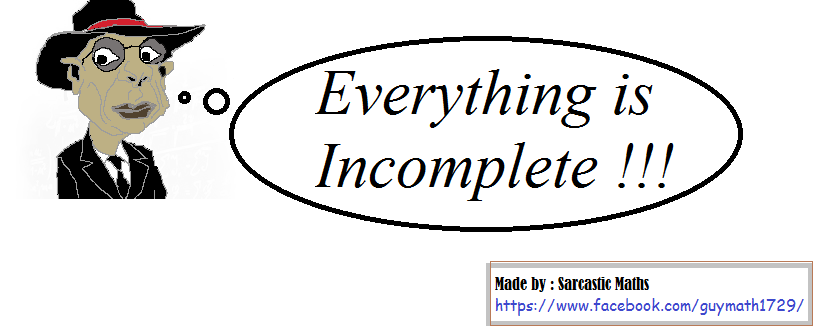Since the dawn of mathematics and logic, there have been two central tenets that have held true: Gödel’s Incompleteness Theorem and the Principle of Explosion. Beyond the academically accepted definitions, these theorems can be used to gain an even deeper understanding of the limits of mathematics, logic, and knowledge. In this blog, we explore the implications of these two theorems and how they can be used to explore the boundaries of what is possible.
One of the most important characteristics of mathematics that sets it apart from any other subject is its precision and objective nature. It deals with the absolute truth of things and isn’t prone to bias. However, mathematics has its own set of limitation. There are several things in our universe that are true ,yet cannot be explained sufficiently by mathematics. What happens if mathematics turns out to be inconsistent and incomplete? What if certain theorem cant be proved as both true and false? The implications of such a situation is enormous and is capable of annihilating the very foundations of mathematics – truth and consistency.
UNDERSTANDING MATHEMATICAL SYSTEMS AND BOUNDARY
Before we question the incompleteness or inconsistency of mathematics, let us understand the structure of a mathematical system. There exists several system such as decimal arithmetic and binary arithmetic, each with its unique set of rules . Each of these systems is built upon the most fundamental assumptions/truths known as axiom. For e.g. in binary arithmetic, we know A.A = A. Each mathematical system has a boundary of its own – meaning, we cannot use axioms outside the system boundary and expect things to work out.For e.g. the axiom A.A = A holds only for binary system and cannot be used during proving a theorem in the decimal domain.
UNDERSTANDING HOW MATHEMATICAL SYSTEMS ARE BUILT ( THROUGH AN ANALOGY)
At its most fundamental level , mathematics consists of simple , intuitive axioms that work together to form much more compound axioms known as theorems. A system of mathematics can be thought of as a building consisting of sub-structures (theorems) that further consists of bricks(axioms). The act of laying down each brick or sub-structure corresponds to the act of proving(proofs). The existence of sub-structures simplify the process of building by having already proven theorems at its disposal. As a rule of thumb, the more the number of theorems that already exists inside the system, the easier it is to prove a new theorem.This process continues, expanding the net pool of theorems and axioms inside that system making it stronger. However, the fabric of each mathematical system is extremely sensitive to error. Meaning, a theorem that can be proved to be both true and false, can singlehandledly cause the entire system to explode disproving every single theorem inside that system.
To understand why, let us understand the principle of explosion.
PRINCIPLE OF EXPLOSION
As discussed earlier, each axiom/theorem depends on every other axiom/theorem in some way as we use these already theorems during our proofs. But what happens if we can prove that some axiom inside is system is both correct and incorrect?
As an example, consider two contradictory statements – “All apples are red” and “Not all apples are red”, and suppose (for the sake of argument) that both are simultaneously true. If that is the case, anything can be proven, e.g. “the sky is blue”, by using the following argument:
-
We know that “All apples are red” as it is defined to be true.
-
Therefore, the statement that (“All apples are red” OR “the sky is blue”) must also be true, since the first part is true.
-
However, if we were to apply “Not all apples are red” which is also true, unicorns must exist – otherwise statement 2 would be false. It has thus been “proven” that the sky is blue. The same could be applied to any assertion, including the statement “the sky is NOT blue”.
If the above part was confusing and difficult to grasp, the principle is essentially saying that if one axiom is ambiguous and is both true and false, then everything else is also the same.
GODEL’S INCOMPLETENESS THEOREMS

First theorem :
Any sufficiently expressive system of mathematics is either incomplete or inconsistent.
For the sake of argument, say, our system is incomplete. No matter how many theorems we prove, there will always be new ones ready to be proven. Thus, a system will never be complete. But what if our system is inconsistent? Is there a way to tell that it is so? Let us take a look at the second theorem.
Second theorem:
A consistent math system cannot prove its own consistency.
According to this theorem, we cannot determine whether or not our system is consistent. This is because, in trying to prove so, we can use any of contradictory statements leading to error.
To conclude, mathematics is both incomplete and perhaps, inconsistent, but we’ll never know, thanks to Godel’s second theorem, unless of course, we stumble upon some practical error caused as a result of mathematical inconsistencies.

One thought on “Gödel’s Incompleteness Theorem and Principle Of Explosion”